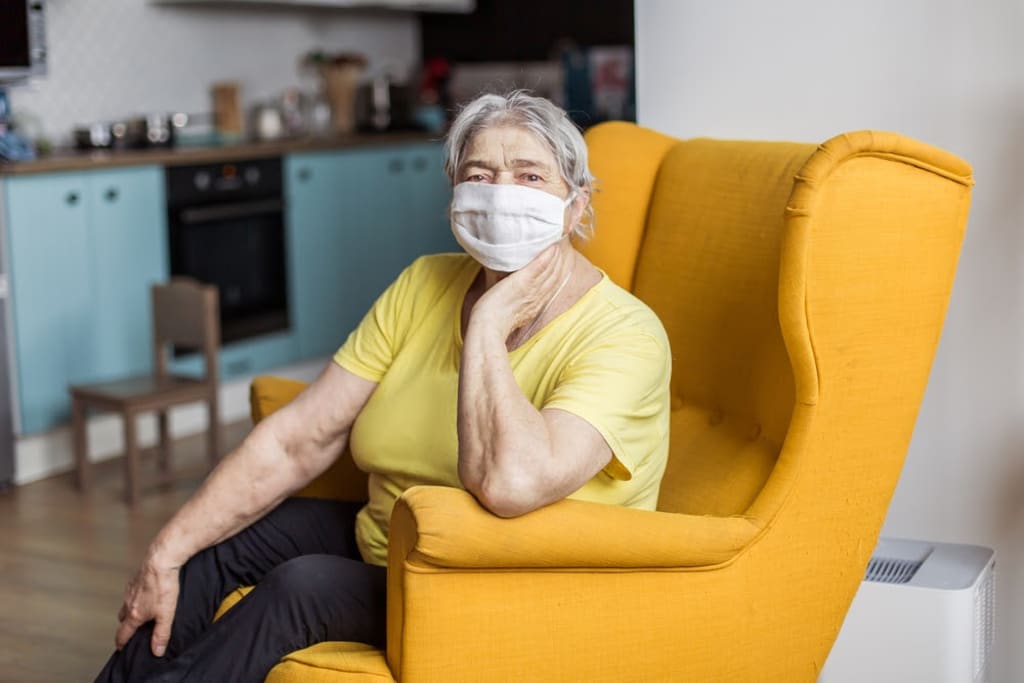8 Tips for Seniors During the Coronavirus Pandemic
Not hard to follow, and it could save lives.

While the COVID-19 pandemic has impacted the health and wellbeing of individuals worldwide, 58% of people say that their finances have been affected by quarantine measures. Seniors who have pre-existing conditions as well as a fixed budget are most at risk for contracting and recovering from the virus. As a result, navigating tasks that would otherwise be simple Sunday to-do’s has become incredibly complicated for individuals in these high-risk groups.
Thankfully, as we all adjust to social-distancing and shelter in place orders due to COVID-19, so have the people and places around us. In this post, we'll discuss eight useful tips and precautions to take for seniors and individuals in high-risk groups.
1. Look for special grocery store hours
Many local grocery stores have taken steps to make it easier for seniors, healthcare workers, and high-risk individuals to get their shopping done without having to wait in long lines or wade through crowded aisles. To minimize these issues, several stores have started offering special hours, limited capacity, and started delivery services for seniors and other eligible individuals.
Contact your local market to see if they’re offering any of these special services during this time. If not, consider going to the grocery store at earlier hours when it’s likely to be less crowded. Plus, stores typically do their stocking at night, so early in the morning is when inventory is more likely to be replenished and less likely to have been in contact with other shoppers.
2. Consider grocery and food delivery
If you’re able to, many experts recommend doing your shopping through online delivery rather than stepping into the grocery store. This directly reduces your risk of being exposed to potentially contaminated persons or surfaces.
Thankfully in our digital era, there are several grocery delivery options to choose from:
Instacart: Same-day grocery delivery from select stores.
TenderGreens: Pre-selected grocery pickup and delivery, available in California.
Walmart Grocery Delivery: Scheduled grocery delivery from local Walmart selection.
Sun Basket: Healthy meal kit delivery subscription service.
Blue Apron: Meal kit delivery service.
In addition to these options, many local farmers and vendors are offering similar services that may be worth looking into as well!
3. Practice good hygiene and cleaning habits
Above all practices, health officials are emphasizing that Americans should continue practicing good hygiene habits, whether or not they’re considered high-risk. Here are a few CDC coronavirus guidelines that seniors and all individuals should follow:
- Wash your hands frequently
- Avoid touching your face
- Cover your cough or sneeze with a tissue, and dispose of it immediately
- Regularly disinfect frequently touched surfaces:
- Doorknobs
- Light switches
- Phones, tablets, remotes
- Sinks
- Toilets
- Kitchen counters
- Chairs and tables
- Sick persons should stay in a separate room as much as possible
If and when you do need to go out for groceries or seek medical care, take precautionary measures such as washing your hands or using hand sanitizer before and after leaving your home, and use disinfectant wipes when available.
4. Locate health centers near you
Preparedness, not panic, is essential at this time, especially for seniors. By locating medical centers in your area, you can plan out the most efficient course of action if you do begin to experience concerning symptoms. Keep in mind, many healthcare clinics have adjusted their hours and procedures to best accommodate patients and workers.
Before you go to the hospital or care clinic, be sure to call ahead or refer to online guidelines so that you can take proper precautionary measures and get the help you need as soon as possible. Many hospitals are offering drive-thru clinics and telehealth appointments to care for patients more efficiently.
If you are a senior or in a high-risk group and begin to notice symptoms, contact your provider immediately to determine what steps to take.
Additionally, make sure you have a trust or will in place in case of worst case scenarios. Being prepared during this time is crucial, and having end of life plans in place if something were to happen to you only makes it easier for your loved ones to give you the celebration of life you’d want.
5. Stay active while social distancing
Keeping your immune system in tip-top shape is more important than ever, and maintaining a regular exercise routine is one of the most beneficial practices you can implement to encourage your body to stay healthy. According to the American Academy of Family Physicians, senior citizens should get approximately 2.5 hours of moderate exercise per week.
Maintaining the motivation to get exercise while practicing social distancing habits isn’t always easy, but there are plenty of resources seniors can take advantage of to make physical activity a priority.
- Use Health.gov exercise guidelines
- Watch senior exercise Youtube videos
- Practice yoga
In addition to keeping up physical activity, experts also stress the importance of eating healthy and following physician recommendations.
6. Ask your healthcare provider for a 90-day supply of your prescriptions
To minimize exposure risk and ensure that patients have access to their medications, experts are recommending that patients request a 90-day supply of prescriptions when possible. Many physicians are offering this possibility to seniors and most other patients.
Another consideration to make is having your prescriptions delivered. Many pharmacies already offer delivery options, so now is the time to take advantage of it!
7. Stay up-to-date on essential information
Although the news can feel overwhelming in our current situation, being informed, at least to some extent, is helpful to ensure that you and your community are following the appropriate COVID safety guidelines recommended by local and federal governments.
8. Keep in touch with friends, family, and neighbors
The world is currently facing uncharted territory, and having to constantly adapt to changes on the daily, but the truth is, we’re all figuring it out together. Thanks to technology and our efforts toward a common goal, there are plenty of ways to stay in touch with those we love and lend or seek a helping hand when needed.
Here are a few ideas to help you stay connected:
- Use video chatting services for virtual face-to-face connection
- FaceTime, Skype, Zoom, Facebook Messenger, and HouseParty are a few applications to choose from.
- Text, call, or email your loved ones, and ask that they check in on you, too.
- Stay connected via social media.
- Send cards or letters to friends and family near and far.
Bottom line, don’t be afraid to ask for help, and do what you can to keep up connection between your loved ones.






Comments
There are no comments for this story
Be the first to respond and start the conversation.